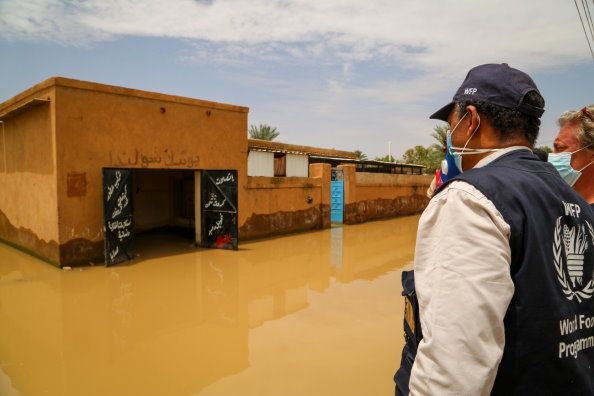WFP Expands Assistance to Families Struggling in Flood-Devastated Regions of Sudan

The United Nations World Food Programme (WFP) is scaling up emergency food assistance to reach nearly 160,000 people across Sudan following floods that ravaged 17 of the country’s 18 states.
“Rains and floods have been much worse than anyone could have anticipated, causing a national disaster,” said WFP Representative and Country Director in Sudan, Hameed Nuru. “People have lost their homes, farmlands, schools and loved ones. Some of these people have lost everything.”
The flooding is the worst Sudan has seen in nearly a century. According to the Government’s Humanitarian Aid Commission, 650,000 people have been affected since the start of the rains in mid-July.
The U.N. World Food Programme provided a first round of emergency food assistance to 7,200 people and distributions for 40,000 people are currently ongoing. “WFP is working tirelessly with the Government of Sudan and partners to get food out to the affected people. Together, we are trying to scale up the number of people reached every day,” he added.
The U.N. World Food Programme is planning to distribute two-week rations to flood-affected people in Khartoum, East and North Darfur, White Nile, North and West Kordofan, Red Sea, Sennar and Kassala. As more assessments are underway, the number of flood-affected people requiring food assistance is likely to increase.
With the heavy rains making access to affected areas difficult, the U.N. World Food Programme has facilitated rapid needs assessments and delivery of assistance using the U.N. World Food Programme-managed UN Humanitarian Air Service (UNHAS). Since the start of flood season, the U.N. World Food Programme has participated in some 20 assessment missions to guide interventions and identify people who are most in need. The U.N. World Food Programme has transported three metric tons of food supplies provided by the government to flood-affected people in Bout town in Blue Nile state.
The devastating floods come at a time when hunger levels remain alarmingly high in Sudan with increased and protracted displacement, economic decline and inflation, and high food price hikes, exacerbated by the impacts of the COVID-19 pandemic. Despite the challenges posed by the COVID-19 outbreak, the U.N. World Food Programme continues to provide emergency food assistance to ensure critical support reach the people in need.
“WFP is also working to implement all necessary precautions during distributions to minimize the risk of contacting or spreading COVID-19 and ensure the safety of staff and the people we serve,” Nuru said.
The U.N. World Food Programme’s flood response to date has been made possible by the generosity of donors, including German Federal Foreign Office, the United Kingdom’s Foreign Commonwealth & Development Office, and the United States Agency for International Development.
# # #
The U.N. World Food Programme is the world’s largest humanitarian organization, saving lives in emergencies, building prosperity and supporting a sustainable future for people recovering from conflict, disasters and the impact of climate change. | Follow us on Twitter @WFPUSA @wfp_media @WFP_Sudan
Contact:
- Shaza Moghraby, WFP/New York, Mob. + 1 929 289 9867
- Steve Taravella, WFP/ Washington, Mob. +1 202 770 5993




